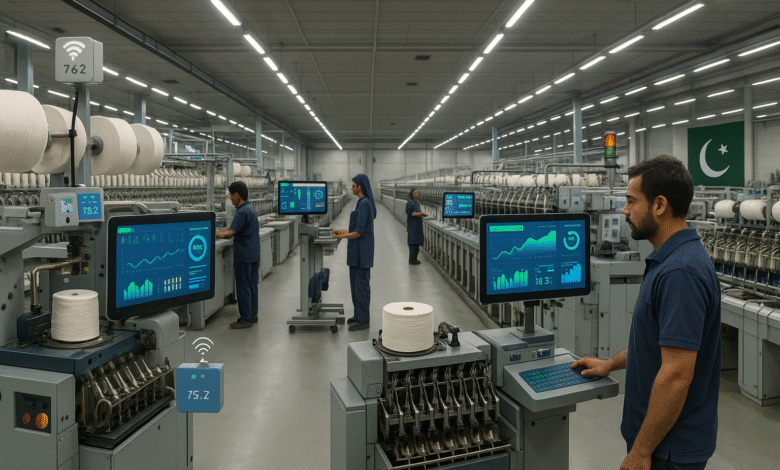
Pakistan’s manufacturing industry is going through a major tech upgrade, with the Internet of Things (IoT) leading the way. Thanks to smart sensors and connected devices becoming more affordable, factories across the country are finding new ways to boost efficiency, cut costs, and compete internationally. But this shift isn’t just about using better tools — it’s a move toward Industry 4.0, a new era of smarter, faster, and more connected manufacturing.
In recent years, IoT adoption in Pakistan’s manufacturing sector has picked up speed. This progress is fueled by government support, private investment, and cheaper sensor technology. From textile factories in Faisalabad to car assembly lines in Karachi, companies are now using smart systems to track equipment in real-time, prevent breakdowns before they happen, and fine-tune production with impressive accuracy.
Understanding IoT Implementation in Pakistan’s Industrial Landscape
The adoption of IoT technologies in Pakistani manufacturing represents a strategic response to both domestic challenges and global competitive pressures. Traditional manufacturing processes in Pakistan have long relied on manual monitoring and reactive maintenance approaches, often resulting in unexpected downtime, inefficient resource utilization, and quality control issues. Smart sensors and IoT devices are fundamentally changing this paradigm by providing continuous data streams that enable proactive decision-making.
Pakistani manufacturers are implementing IoT solutions across various operational areas, including production line monitoring, energy management, supply chain optimization, and quality assurance. These applications leverage interconnected devices, wireless communication networks, and cloud-based analytics platforms to create comprehensive manufacturing intelligence systems. The result is a more responsive, efficient, and competitive manufacturing environment that can adapt quickly to market demands and operational challenges.
The infrastructure supporting IoT in Pakistani manufacturing has evolved significantly, with improved internet connectivity, expanded cellular networks, and growing cloud computing capabilities. Major cities like Lahore, Karachi, and Islamabad now offer robust digital infrastructure that supports real-time data transmission and processing, making IoT implementation more feasible for manufacturers of all sizes.
Smart Sensor Technologies Transforming Pakistani Industries
Smart sensors form the foundation of IoT ecosystems in manufacturing environments, serving as the eyes and ears that collect critical operational data. In Pakistani manufacturing facilities, these sophisticated devices monitor everything from temperature and humidity levels to vibration patterns and energy consumption. The data collected by these sensors provides unprecedented visibility into manufacturing processes, enabling operators to identify inefficiencies, predict equipment failures, and optimize production parameters.
Temperature and environmental sensors are particularly valuable in Pakistan’s diverse manufacturing sectors. Textile manufacturers use these devices to maintain optimal conditions for fiber processing and fabric production, while food processing companies rely on precise temperature monitoring to ensure product safety and quality. The ability to continuously monitor environmental conditions has proven especially important given Pakistan’s challenging climate conditions and seasonal variations.
Vibration sensors and accelerometers have revolutionized predictive maintenance practices in Pakistani manufacturing. These devices can detect subtle changes in equipment behavior that often precede mechanical failures, allowing maintenance teams to address issues before they cause costly downtime. Steel mills, cement plants, and chemical processing facilities have reported significant reductions in unplanned maintenance events after implementing comprehensive vibration monitoring systems.
Pressure sensors and flow meters play crucial roles in optimizing resource utilization across various industries. Pakistani manufacturers use these devices to monitor compressed air systems, hydraulic equipment, and fluid processing operations. The real-time data provided by these sensors enables operators to identify leaks, optimize pressure levels, and reduce energy consumption associated with pump and compressor operations.
Industrial Automation and Process Optimization
The integration of IoT technologies with industrial automation systems has created powerful synergies that amplify efficiency gains in Pakistani manufacturing. Smart sensors provide the data foundation that enables automated systems to make intelligent decisions about production parameters, equipment operations, and quality control measures. This combination of sensing and automation capabilities has proven particularly effective in continuous process industries such as chemical manufacturing, pharmaceutical production, and food processing.
Pakistani textile manufacturers have embraced IoT-enabled automation to optimize spinning, weaving, and dyeing processes. Smart sensors monitor yarn tension, fabric quality, and chemical concentrations, automatically adjusting machine parameters to maintain consistent output quality. These systems have reduced material waste, improved color consistency, and increased overall production efficiency in facilities across Punjab and Sindh provinces.
The automotive industry in Pakistan has leveraged IoT technologies to enhance assembly line operations and quality control processes. Smart sensors monitor torque specifications, dimensional tolerances, and surface finishes throughout the production process, automatically flagging potential quality issues before they impact final products. This proactive approach to quality management has helped Pakistani automotive manufacturers meet international standards and expand their export capabilities.
Process optimization through IoT extends beyond individual machines to encompass entire production workflows. Manufacturing execution systems integrated with IoT sensors provide real-time visibility into production schedules, resource allocation, and bottleneck identification. Pakistani manufacturers report significant improvements in overall equipment effectiveness (OEE) and reduced cycle times after implementing comprehensive IoT-based process optimization solutions.
Also Read: The Future of Smart Homes in Pakistan with IoT
Predictive Maintenance Revolution in Pakistani Factories
Predictive maintenance represents one of the most impactful applications of IoT in Pakistani manufacturing, transforming traditional reactive maintenance approaches into proactive, data-driven strategies. Smart sensors continuously monitor equipment health parameters, identifying patterns and anomalies that indicate potential failures before they occur. This shift from scheduled or reactive maintenance to condition-based maintenance has delivered substantial cost savings and operational improvements across various industries.
Pakistani cement manufacturers have been early adopters of IoT-based predictive maintenance solutions, deploying sensor networks throughout their production facilities to monitor critical equipment such as kilns, crushers, and conveyor systems. These implementations have reduced unplanned downtime by up to 40% while extending equipment life cycles and optimizing maintenance resource allocation.
The power generation sector in Pakistan has embraced predictive maintenance technologies to improve the reliability of thermal and hydroelectric facilities. Smart sensors monitor turbine performance, generator conditions, and auxiliary equipment, providing early warning of potential issues that could impact power generation capacity. These systems have proven particularly valuable given Pakistan’s energy security challenges and the critical importance of maintaining consistent power supply.
Machine learning algorithms integrated with IoT sensor data have enhanced the accuracy and reliability of predictive maintenance systems in Pakistani manufacturing. These advanced analytics capabilities can identify complex patterns and correlations that human operators might miss, providing more precise predictions of equipment failure modes and optimal maintenance timing. The result is more efficient maintenance scheduling and reduced risk of unexpected equipment failures.
Energy Management and Sustainability Solutions
Energy management has become a critical focus area for IoT implementation in Pakistani manufacturing, driven by rising energy costs, sustainability commitments, and government initiatives promoting energy efficiency. Smart sensors and IoT devices enable manufacturers to monitor energy consumption patterns with unprecedented granularity, identifying opportunities for optimization and waste reduction across their operations.
Pakistani steel manufacturers have implemented comprehensive energy monitoring systems that track electricity consumption, fuel usage, and thermal energy utilization throughout their production processes. These systems provide real-time feedback on energy efficiency metrics, enabling operators to optimize furnace operations, reduce standby power consumption, and implement demand response strategies during peak pricing periods.
The textile industry, which represents a significant portion of Pakistan’s manufacturing sector, has leveraged IoT technologies to optimize energy-intensive processes such as dyeing, finishing, and climate control. Smart sensors monitor steam consumption, compressed air usage, and electrical loads, providing data that enables operators to implement energy-saving measures without compromising production quality or throughput.
Renewable energy integration has been enhanced through IoT technologies in Pakistani manufacturing facilities. Smart sensors monitor solar panel performance, wind generation capacity, and energy storage systems, optimizing the utilization of renewable energy sources and reducing dependence on grid electricity. These implementations support Pakistan’s renewable energy goals while providing long-term cost savings for manufacturers.
Quality Control and Real-Time Monitoring Systems
Quality control has been revolutionized through IoT implementation in Pakistani manufacturing, with smart sensors enabling continuous monitoring of product characteristics and process parameters that affect quality outcomes. Real-time quality monitoring systems can detect deviations from specifications immediately, allowing for rapid corrective actions that prevent defective products from progressing through production processes.
Pakistani pharmaceutical manufacturers have implemented sophisticated IoT-based quality monitoring systems that track critical parameters such as temperature, humidity, pressure, and chemical concentrations throughout drug production processes. These systems ensure compliance with international quality standards and regulatory requirements while reducing the risk of batch failures and product recalls.
The food processing industry in Pakistan has embraced IoT technologies to enhance food safety and quality assurance programs. Smart sensors monitor temperatures throughout cold chain processes, detect contamination risks, and verify compliance with hygiene standards. These implementations have helped Pakistani food manufacturers meet export quality requirements and expand their international market presence.
Vision systems integrated with IoT networks provide automated inspection capabilities that surpass human visual inspection in terms of speed, consistency, and accuracy. Pakistani manufacturing facilities use these systems to detect surface defects, dimensional variations, and assembly errors, ensuring that only products meeting quality specifications reach customers.
Supply Chain Integration and Logistics Optimization
IoT technologies have transformed supply chain visibility and logistics optimization for Pakistani manufacturers, creating connected ecosystems that span from raw material suppliers to end customers. Smart sensors and tracking devices provide real-time information about inventory levels, shipment locations, and delivery schedules, enabling more responsive and efficient supply chain management.
Pakistani exporters have implemented IoT-enabled container tracking systems that monitor shipment conditions during international transport. These systems track temperature, humidity, shock, and location data, ensuring that products arrive at their destinations in optimal condition while providing customers with real-time shipment visibility.
Warehouse management has been enhanced through IoT implementation, with smart sensors monitoring inventory levels, environmental conditions, and equipment performance in storage facilities. Automated inventory tracking systems reduce manual counting requirements while improving accuracy and reducing carrying costs for Pakistani manufacturers.
Just-in-time manufacturing strategies have been enabled through IoT integration with supplier networks, providing real-time visibility into component availability and delivery schedules. This enhanced coordination has reduced inventory holding costs while improving production planning flexibility for Pakistani manufacturers.
Challenges and Solutions in IoT Adoption
Despite the significant benefits of IoT implementation, Pakistani manufacturers face several challenges in adopting these technologies. Infrastructure limitations, including inconsistent internet connectivity and power supply issues, can impact the reliability of IoT systems. However, manufacturers are addressing these challenges through hybrid cloud architectures, edge computing solutions, and backup power systems that ensure continuous operation.
Cybersecurity concerns represent another significant challenge for IoT adoption in Pakistani manufacturing. Connected devices and networks create potential vulnerabilities that must be addressed through comprehensive security frameworks. Manufacturers are implementing network segmentation, encryption protocols, and regular security assessments to protect their IoT investments.
Skills development and workforce training have emerged as critical success factors for IoT implementation. Pakistani manufacturers are investing in training programs that develop the technical expertise needed to operate and maintain IoT systems effectively. Partnerships with local universities and technical institutes are helping to build the skilled workforce necessary to support continued IoT adoption.
Cost considerations continue to influence IoT adoption decisions, particularly for small and medium-sized manufacturers. However, the decreasing costs of sensor technologies, cloud computing services, and wireless communication networks are making IoT solutions more accessible to manufacturers of all sizes in Pakistan.
Future Prospects and Emerging Trends
The future of IoT in Pakistani manufacturing looks increasingly promising, with emerging technologies such as 5G networks, artificial intelligence, and edge computing poised to enhance IoT capabilities further. These advances will enable more sophisticated applications, faster response times, and improved system reliability for Pakistani manufacturers.
Artificial intelligence integration with IoT systems will provide more advanced analytics capabilities, enabling predictive models that can anticipate market demands, optimize production schedules, and identify new efficiency opportunities. Pakistani manufacturers are beginning to explore these advanced applications as AI technologies become more accessible and affordable.
Government initiatives supporting digital transformation in manufacturing are expected to accelerate IoT adoption across Pakistan’s industrial sectors. Policy frameworks that promote technology adoption, provide financial incentives, and support infrastructure development will create favorable conditions for continued IoT implementation.
The emergence of industry-specific IoT solutions tailored to Pakistani manufacturing requirements will further drive adoption rates. Local technology providers are developing specialized applications that address the unique challenges and opportunities present in Pakistan’s manufacturing environment.
Conclusion
IoT in Pakistani manufacturing represents a transformative force that is reshaping the country’s industrial landscape and positioning Pakistani manufacturers for global competitiveness. Smart sensors and connected devices are delivering measurable improvements in operational efficiency, cost reduction, and product quality across diverse manufacturing sectors. As infrastructure continues to improve and technology costs decrease, IoT adoption will likely accelerate, bringing even greater benefits to Pakistani manufacturers.
The success stories emerging from early IoT adopters demonstrate the significant potential for continued growth and innovation in this space. Pakistani manufacturers who embrace these technologies today will be better positioned to compete in an increasingly digital global marketplace while contributing to the country’s economic development and industrial modernization goals.
The journey toward comprehensive IoT implementation in Pakistani manufacturing is still in its early stages, but the foundation has been established for sustained growth and innovation. With continued investment in infrastructure, skills development, and technology adoption, Pakistan’s manufacturing sector is poised to realize the full potential of IoT technologies and secure its position as a competitive force in global markets.











